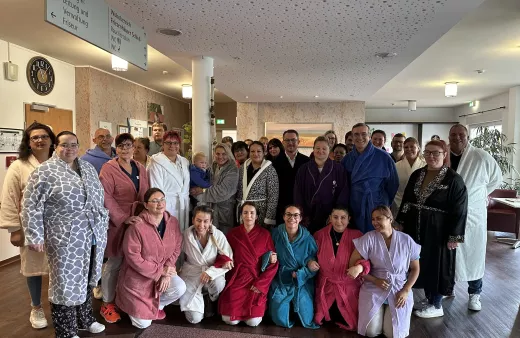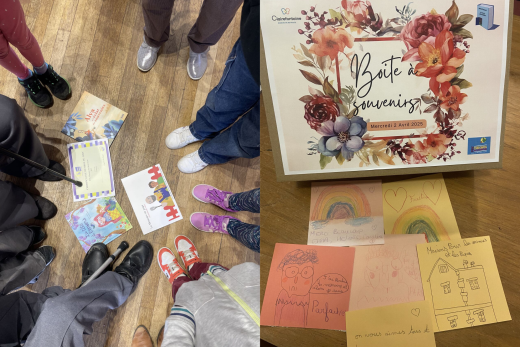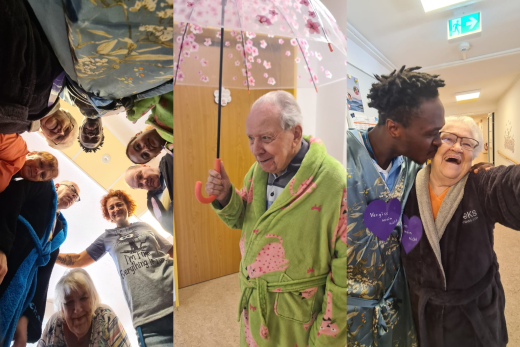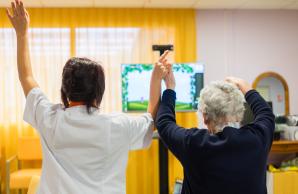Alzheimer’s disease: Clariane’s commitment to a more inclusive society

Alzheimer’s disease remains all too often misunderstood and stigmatised, meaning a new perspective is necessary. Clariane is working to build a more inclusive society that values the participation of people with Alzheimer’s – and it is doing so through initiatives such as the Chronos Alzheimer Prize in France and the Bademantel Challenge in Germany, promoting dialogue, interaction and intergenerational meetings.
Chronos Alzheimer Prize: a literary prize to raise awareness of Alzheimer’s disease among young people
In France, through its network of Korian long-term care nursing homes, Clariane is involved in the Chronos Alzheimer Prize, organised in partnership with Uniopss and the Médéric Alzheimer Foundation. This intergenerational literary prize brings together residents and primary school students around a selection of children’s picture books addressing themes such as illness, memories, and sharing knowledge.
The aim is to make young people more aware of Alzheimer’s disease and, more broadly, help to change society’s view of neurodegenerative diseases.
In 2025, 75 Korian care homes took part in the initiative, offering residents the opportunity to be actively involved in choosing the books and participating in shared reading sessions. Children learn about their elders’ wealth of experience, while residents rediscover their role as actors and storytellers.
These interactions, in which young and old people alike discuss the same books, help provide cognitive stimulation for Alzheimer’s sufferers, reduce social isolation and strengthen bonds between generations.
The Chronos Alzheimer Prize fully embodies Clariane’s approach: creating spaces for dialogue, sharing and inclusion where everyone, including people with cognitive disorders, is recognised and valued.

“Bademantel Challenge”: everyone in bathrobes!
In Germany, the #BademantelChallenge (#BathrobeChallenge) is a national campaign created by Deutsche Demenzhilfe, the endowment fund of the DZNE-Stiftung, with scientific support from the DZNE Institute (Deutsches Zentrum für Neurodegenerative Erkrankungen).
The initiative aims to take a new approach to raising awareness of Alzheimer’s disease while highlighting the challenges faced by those affected and their loved ones.
Korian care homes are actively involved in the challenge, sharing content on social media and naming three other facilities in turn. Employees are encouraged to wear a dressing gown in an everyday situation to symbolise the feelings of confusion and disorientation that can be experienced by people with Alzheimer’s disease.
Several facilities have built on the challenge, organising sensory pathways and immersive workshops allowing teams, families and visitors to better understand the cognitive and motor difficulties related to the disease. These initiatives strengthen empathy, while contributing to a better understanding of residents’ daily lives.

Other inclusive initiatives in Europe
Clariane runs innovative projects in each of its countries to promote a society where people living with Alzheimer’s disease are fully integrated and play an active part in their own daily lives:
- In Italy, the “Fermata Alzheimer” initiative raises the general public’s awareness through a series of talks, facility open days and workshops around non-pharmacological interventions. The “Alzheimer in Lab” sensory journey lets visitors put themselves in the shoes of a person with Alzheimer’s to gain a better understanding of their daily challenges.
- In Belgium, Alzheimer’s cafes and reminiscence workshops are regularly held to stimulate memories, promote discussion and reduce feelings of isolation. These moments strengthen the bonds between residents, loved ones and teams, and help raise awareness in the local community.
- In the Netherlands, the teams provide psychobiographic care following Professor Böhm’s method, which is based on the personal history and lifestyle habits of the residents. Care environments are designed on a human scale to maintain reference points, encourage autonomy and support each person’s dignity.
- In Spain, facilities organise intergenerational workshops, artistic activities and sensory programmes that promote cognitive stimulation and strengthen social connection. Families are invited to participate, creating a broader, more inclusive support network.
All these initiatives illustrate our philosophy of care, Positive Care, where people are at the heart of everything we do.

